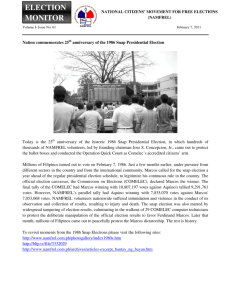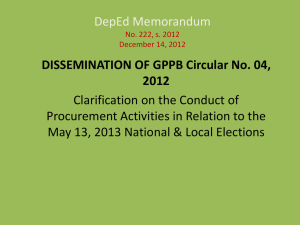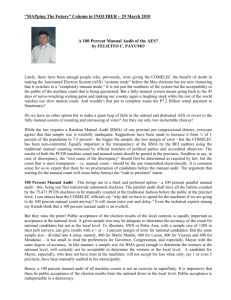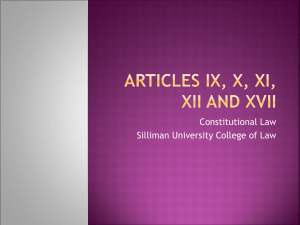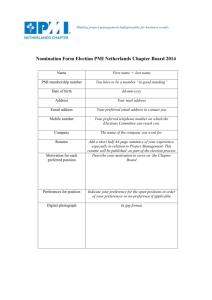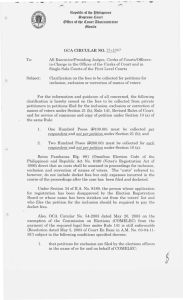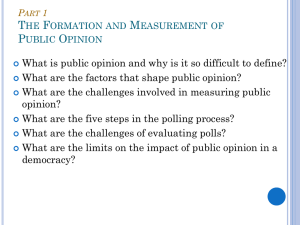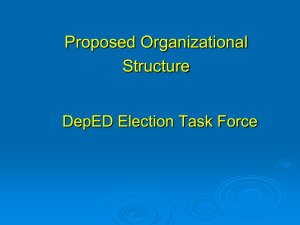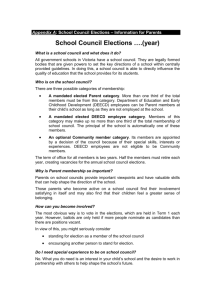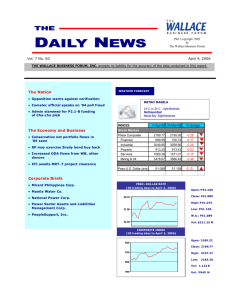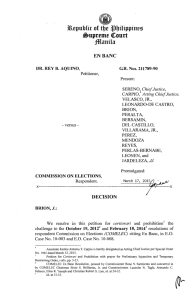Namfrel E-Newsletter Vol 1 Issue 62 021111
advertisement
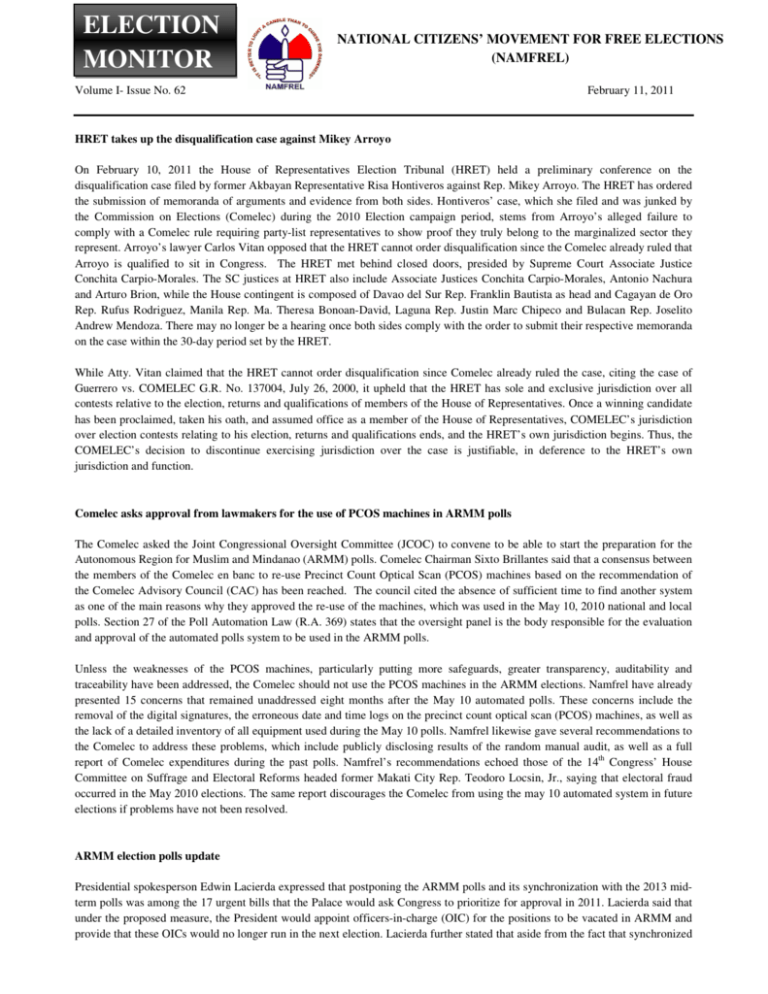
ELECTION MONITOR NATIONAL CITIZENS’ MOVEMENT FOR FREE ELECTIONS (NAMFREL) Volume I- Issue No. 62 February 11, 2011 HRET takes up the disqualification case against Mikey Arroyo On February 10, 2011 the House of Representatives Election Tribunal (HRET) held a preliminary conference on the disqualification case filed by former Akbayan Representative Risa Hontiveros against Rep. Mikey Arroyo. The HRET has ordered the submission of memoranda of arguments and evidence from both sides. Hontiveros’ case, which she filed and was junked by the Commission on Elections (Comelec) during the 2010 Election campaign period, stems from Arroyo’s alleged failure to comply with a Comelec rule requiring party-list representatives to show proof they truly belong to the marginalized sector they represent. Arroyo’s lawyer Carlos Vitan opposed that the HRET cannot order disqualification since the Comelec already ruled that Arroyo is qualified to sit in Congress. The HRET met behind closed doors, presided by Supreme Court Associate Justice Conchita Carpio-Morales. The SC justices at HRET also include Associate Justices Conchita Carpio-Morales, Antonio Nachura and Arturo Brion, while the House contingent is composed of Davao del Sur Rep. Franklin Bautista as head and Cagayan de Oro Rep. Rufus Rodriguez, Manila Rep. Ma. Theresa Bonoan-David, Laguna Rep. Justin Marc Chipeco and Bulacan Rep. Joselito Andrew Mendoza. There may no longer be a hearing once both sides comply with the order to submit their respective memoranda on the case within the 30-day period set by the HRET. While Atty. Vitan claimed that the HRET cannot order disqualification since Comelec already ruled the case, citing the case of Guerrero vs. COMELEC G.R. No. 137004, July 26, 2000, it upheld that the HRET has sole and exclusive jurisdiction over all contests relative to the election, returns and qualifications of members of the House of Representatives. Once a winning candidate has been proclaimed, taken his oath, and assumed office as a member of the House of Representatives, COMELEC’s jurisdiction over election contests relating to his election, returns and qualifications ends, and the HRET’s own jurisdiction begins. Thus, the COMELEC’s decision to discontinue exercising jurisdiction over the case is justifiable, in deference to the HRET’s own jurisdiction and function. Comelec asks approval from lawmakers for the use of PCOS machines in ARMM polls The Comelec asked the Joint Congressional Oversight Committee (JCOC) to convene to be able to start the preparation for the Autonomous Region for Muslim and Mindanao (ARMM) polls. Comelec Chairman Sixto Brillantes said that a consensus between the members of the Comelec en banc to re-use Precinct Count Optical Scan (PCOS) machines based on the recommendation of the Comelec Advisory Council (CAC) has been reached. The council cited the absence of sufficient time to find another system as one of the main reasons why they approved the re-use of the machines, which was used in the May 10, 2010 national and local polls. Section 27 of the Poll Automation Law (R.A. 369) states that the oversight panel is the body responsible for the evaluation and approval of the automated polls system to be used in the ARMM polls. Unless the weaknesses of the PCOS machines, particularly putting more safeguards, greater transparency, auditability and traceability have been addressed, the Comelec should not use the PCOS machines in the ARMM elections. Namfrel have already presented 15 concerns that remained unaddressed eight months after the May 10 automated polls. These concerns include the removal of the digital signatures, the erroneous date and time logs on the precinct count optical scan (PCOS) machines, as well as the lack of a detailed inventory of all equipment used during the May 10 polls. Namfrel likewise gave several recommendations to the Comelec to address these problems, which include publicly disclosing results of the random manual audit, as well as a full report of Comelec expenditures during the past polls. Namfrel’s recommendations echoed those of the 14th Congress’ House Committee on Suffrage and Electoral Reforms headed former Makati City Rep. Teodoro Locsin, Jr., saying that electoral fraud occurred in the May 2010 elections. The same report discourages the Comelec from using the may 10 automated system in future elections if problems have not been resolved. ARMM election polls update Presidential spokesperson Edwin Lacierda expressed that postponing the ARMM polls and its synchronization with the 2013 midterm polls was among the 17 urgent bills that the Palace would ask Congress to prioritize for approval in 2011. Lacierda said that under the proposed measure, the President would appoint officers-in-charge (OIC) for the positions to be vacated in ARMM and provide that these OICs would no longer run in the next election. Lacierda further stated that aside from the fact that synchronized elections would be cost-effective, the postponement of the ARMM polls would give the government enough time to ensure clean and orderly elections for the region. In support to this call, lawyer Macabangkit Lanto, former speaker of the Regional Legislative Assembly, said it would be impossible to hold “a fair, honest and credible election in the ARMM while there is still unstable peace in the area and a constant threat from the `mujahideens' (freedom fighters), especially from the breakaway faction of the Moro Islamic Liberation Front (MILF) under Commander (Ameril Umbra) Kato. He also suggested that government funds set to be used for the August 8, 2011 regional elections be used instead to clean up the padded voters’ lists. However, Muslimin Sema, vice mayor of this city and chairman of the mainstream faction of the Moro National Liberation Front (MNLF) cited that appointing new officials to govern ARMM while the election is postponed might loss the opportunity for the region to grow with foreign pledges and commitment worth more than 150 million dollars coming from the World Bank and Australian government. Namfrel seeks to consult ARMM people if they agree or not to suspend the ARMM polls. However, postponing the ARMM elections for the 8th time also defeats the international standard of a free and fair election because of not having regularity of polls and a problem that would arise as a result of a political vacuum due to election postponement. Key findings of study on Philippine political parties presented The Ateneo School of Government, in cooperation with the Friedrich Naumann Foundation presented on Thursday, February 10, in Dusit Thani hotel key findings of the PODER (Political Democracy and Reforms) Program of the Ateneo in their "Study on Philippine Political Party Performance and Stability." The study profiles five Philippine political parties: three that are considered mainstream parties (MPs) which are the Liberal Party, Nacionalista Party, and LAKAS-CMD; and two non-mainstream parties (NMPs), Akbayan and Bayan Muna. The study sheds light on the state of political parties in the Philippines: how they are being run, how they are funded, and whether they are able to effectively communicate their platforms to the public, among other areas of concern. The study's findings are illuminating, and should be valuable not only to the public and to civil society organizations seeking reforms, but most especially to the political parties themselves keen on strengthening their organization and on reaching out to the public more effectively. Some of the findings are the following: majority of the members of mainstream parties (MPs) are from the political and economic elite (old/nouveau riche), some with military background (especially in the case of Lakas), with intention to run for office; non-mainstream parties (NMPs) are from the grassroots and civil society organizations; NMPs have more members than MPs; however, this may not be directly proportional to political influence; as Philippine politics remains personality-oriented, the agenda of MPs are usually set forth by their head and/or their most famous members (making the party platform less coherent), including funding for the party's activities, usually during election period only; for NMPs, their activities (which are sustained even during non-election periods) are largely driven by platform and/or ideology; however, in the last election, NMPs showed signs of personality politics by fielding candidates with "winnability" factor, and by coalescing with MPs, for which they got flak from their ranks as members of MPs are generally considered traditional politicians; NMPs have a more functional organizational structure; for MPs, decision-making is largely top-down, and the possibility of moving up the ranks is based on a member's resources and "winnability;" the problems of party-switching, factionalism, and splits are generally present only in MPs; especially among MPs, there is ineffective accountability mechanism against erring members; the study also observes that this is largely reactionary instead of proactive; unlike the NMPs, MPs generally have no strong youth arms and do not have active recruitment programs and activities outside election periods; membership surges during election periods; both MPs and NMPs have difficulty maintaining a good database of their members, an effective mechanism for collecting membership dues, and transparent and accessible finances, although this is changing The PODER study underlines the importance of looking into the operations of political parties as they are a good indicator of the state of democracy in a country. As LENTE co-convenor Carlos Medina said during his reaction speech to the presentation, political parties, though they are part of the problem, are also part of the solution. The study also proves that it is no longer accurate to say that there are no real political parties in the Philippines, as evidenced by the emergence of grassroots organizations and coalitions turning into bona fide political parties, joining mainstream politics, and winning elections. The study is still a work-in-progress and a finalized report is expected to be released soon. The PODER study is part of a comparative regional research project of the Institute for Southeast Asian studies in Singapore that aims to have a fresh and pragmatic look at the major parties in ASEAN countries by focusing more on practical party politics and operations. [Source: ABS-CBN news, Philippine Daily Inquirer, Namfrel data, PODER] National Citizens Movement for Free Elections (NAMFREL) Unit 601 DMG Center Domingo M. Guevara St. corner Calbayog Ext. Mandaluyong City, Philippines 1550 Website: www.namfrel.org.ph DISCLAIMER: Any information, opinions or views of the authors or sources referred to in this report do not represent the position of NAMFREL. While reasonable care has been taken to ensure that the information contained herein is not untrue at the time of publication, NAMFREL makes no representation that it is accurate or complete. The information contained herein is subject to change without notice. NAMFREL, or any of its officers or employees, does not accept any liability for any and all direct or consequential losses or damages arising from any use of this publication or its contents. For comments please e-mail: kristine.rosales@namfrel.com.ph
